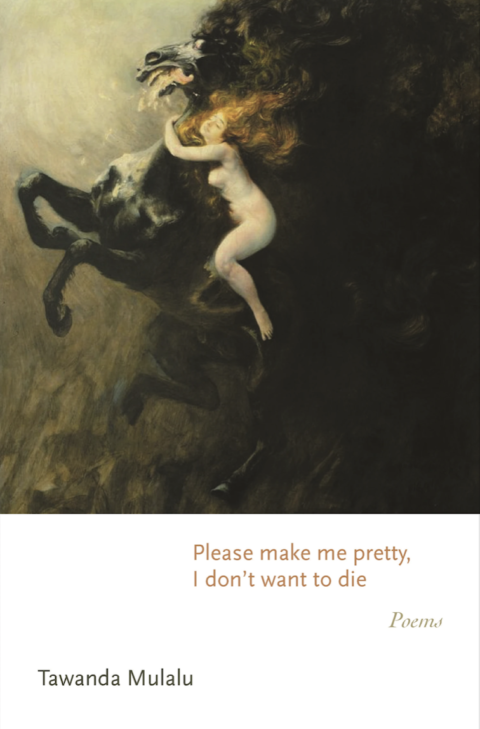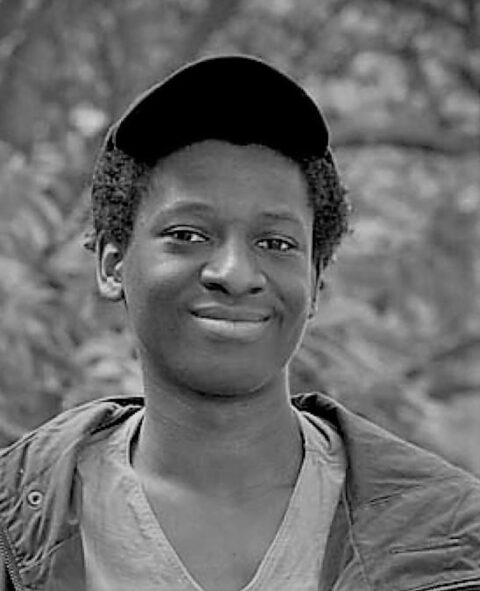“We stop now to consider our lungs,” Tawanda Mulalu writes in one of the opening poems of his \debut poetry collection, Please make me pretty, I don’t want to die. To consider our lungs is to consider our breath. This meter of our living and, concurrently, our dying. Mulalu writes, “If I saw a starving black child my first thought would not be to take this picture of myself. Or wake. Everyone is dying. There are such pretty words for this.” In this collection of work, crafted during a pandemic rife with terror, displacement, police brutality, sickness, ecological crisis, and xenophobia, Tawanda Mulalu lingers in the self, in the confessional and the sincere, as he makes of breathing a practice, envisioning the world through a strangeness of perception — or, as Tracy K. Smith commented, through “flashes of stark, irrefutable knowing” — that resists revelation and reconciles the lyric mode with unknowing and wonder.
 Too young, we are taught that pain is a reminder that we are still alive. Mulalu, a Black man of the African diaspora (b. 1997, Gaborone, Botswana) who found himself stuck in America when the pandemic hit in 2020, writes with a kind of heartache that neither refutes nor celebrates this reminder. In “Song,” Mulalu writes, “Forgive myself for breath and this song / should die.” With lines that break and retreat like the tide, constantly recirculating meaning, Mulalu imparts the complexities of his being here: “I am as new as the paintings in this cave. / Am the same burrowing of grain into body and loss. / Am the same ochre and hematite, inevitable and sorry.” Embedded in this statement, beneath breath, nearly straining for breath, is an understanding that to feel sorrow while being alive is an “inevitability” that makes one human. In a prose poem titled “Poetry in America,” Mulalu quotes Czeck composer Antonín Dvořák, writing:
Too young, we are taught that pain is a reminder that we are still alive. Mulalu, a Black man of the African diaspora (b. 1997, Gaborone, Botswana) who found himself stuck in America when the pandemic hit in 2020, writes with a kind of heartache that neither refutes nor celebrates this reminder. In “Song,” Mulalu writes, “Forgive myself for breath and this song / should die.” With lines that break and retreat like the tide, constantly recirculating meaning, Mulalu imparts the complexities of his being here: “I am as new as the paintings in this cave. / Am the same burrowing of grain into body and loss. / Am the same ochre and hematite, inevitable and sorry.” Embedded in this statement, beneath breath, nearly straining for breath, is an understanding that to feel sorrow while being alive is an “inevitability” that makes one human. In a prose poem titled “Poetry in America,” Mulalu quotes Czeck composer Antonín Dvořák, writing:
“I am convinced that the future music of this country must be founded on what are called Negro melodies. I say this land does not belong to anyone. I let my hair kink in shapes. I try love myself in the mirror. I conjure you next to me before closing my eyes. Listen. The waves. The screaming beneath them. It carries over to you. Walk with me there.”
Mulalu reminds us that song comes from the shared sorrow of breath — in this case, a sorrow that stems from an American past that bleeds into present and future, a project built upon enslavement, genocide, and stolen land. To forgive oneself for breath is, in a way, to disappear the self, or submit to a landscape that longs to disappear you. Instead, like a singer of arias, Mulalu makes his breathing a practice that is incorporated into the lyric structure of his poems.
 Like breathing, desire for the self becomes a practice to work toward in Mulalu’s poetry. The poet confronts mirrors everywhere in the world and makes them strange, beauty or “prettiness” at the fulcrum of the desire to live. “Mirrors are little darknesses / Not unlike my mouth how I try sounds / But find water.” The way a photographer’s subject can often sneakily depict a self-portrait, desire for the self is articulated through the narrator’s perception of others. “& where should I find myself,” Mulalu asks, “if not in my mother’s eyes or my father’s / hands or my sister’s care / for the world.” The speaker rediscovers his own beauty through others’ perception of him. “I am asking for this life to call for me. I am asking myself to call for / the acceptance of this skin, its pre- / dispositions, navigated keenly by eyes which aren’t my own.” Mulalu’s recognition (or re-cognition) of his own ambivalence toward a fixed standard of “beauty” instructs the readers’ gaze toward the true strangeness of beauty or — a better way of putting it — the poet, by practicing (calling for, tending to, perceiving, being) the strangeness of beauty, renews our ability to see. In a poem titled “Vertabrae,” a beloved names that “something in my teeth. / You called it a smile. I sound it out again and again.” As beloveds help the poet see these “stark flashes” of beauty within himself, the poet stumbles upon reasons for being.
Like breathing, desire for the self becomes a practice to work toward in Mulalu’s poetry. The poet confronts mirrors everywhere in the world and makes them strange, beauty or “prettiness” at the fulcrum of the desire to live. “Mirrors are little darknesses / Not unlike my mouth how I try sounds / But find water.” The way a photographer’s subject can often sneakily depict a self-portrait, desire for the self is articulated through the narrator’s perception of others. “& where should I find myself,” Mulalu asks, “if not in my mother’s eyes or my father’s / hands or my sister’s care / for the world.” The speaker rediscovers his own beauty through others’ perception of him. “I am asking for this life to call for me. I am asking myself to call for / the acceptance of this skin, its pre- / dispositions, navigated keenly by eyes which aren’t my own.” Mulalu’s recognition (or re-cognition) of his own ambivalence toward a fixed standard of “beauty” instructs the readers’ gaze toward the true strangeness of beauty or — a better way of putting it — the poet, by practicing (calling for, tending to, perceiving, being) the strangeness of beauty, renews our ability to see. In a poem titled “Vertabrae,” a beloved names that “something in my teeth. / You called it a smile. I sound it out again and again.” As beloveds help the poet see these “stark flashes” of beauty within himself, the poet stumbles upon reasons for being.
Perhaps the most strikingly intimate poems here are about Mulalu’s time spent as a third grade teacher’s assistant, where the roots of this poet’s tenderness unfurl, finally, with space enough to travel. His students act as both window and mirror to a heart of wonder. Early in this collection, he writes, “But O I love how dolphins swim, how their blood screams at them when the white moon pulls tides with its myths … And on playgrounds I so badly wanted to be a dolphin! Still my fur, how mightily it weighs me as him..” The child within the speaker is affected by the weight of his own keen understanding of our transience and distance from one another. In the poem “Near It,” Mulalu writes:
… I clean
their hands and think again of their minds, stumbling across
mathematics. Imagine the soft marvel of another planet
where other minds do not stumble, cannot marvel, cannot I
but only sing …
… I am so close to safety
I could confirm it now: in my chest, a dream gone, breathing.
These children — distanced from the poet, yet wrapping their constricting and conciliatory hands about his heart — teach us this process of un-knowing, of hope and submission to mystery, of the possibility of love’s reciprocity. As children do, they inspire for Mulalu joy and newness, yet remind him of the “music [that] is left: the calm disappearance of ice from poles, the smiling of children before the end of children.” Mulalu wishes to nurture this joy in them while at the same time protect them from the very real dangers that threaten their being: “I want to preserve their bodies in warmed amber. They will quiet then. Then I might lift them into the next springing of clouds with sky not just white, not just constant frothing of white speck and flash of white reflected, returned to this hemisphere: to when I was as small as them.” In the form of the prose poem, Mulalu finds a “room” for silence and stillness, for elegy and prayer, for return, where noise signifies the continuance of “this going Earth” that he wishes to stave off yet knows he must rise to and contend with, understanding that without sorrow there can be no joy, no ability to “marvel.” “Listen” the poet implores, “a love song is complete with discord. You call it life. I call it respiration.”
In this rising, however, in the breaking that is this rising, is our collected sorrow, or “the grave light of joy” to quote Ross Gay. I feel hope reading Mulalu’s work, that in the “hardening colors of a skid knee, the closeness of blood into memory” there is a reciprocal language of care to be sought after. Mulalu employs a language that expands the temporal bounds of the elegy, scattered through the collection like seeds, where one can feel this striving, can feel the seed as it breaks open.
I think I want to live
too often sometimes
because the terrible sound of this world
can reduce itself to a smile
In poems that live and die with the measured slowness of the body, an intimacy abounds that locates and tends the wound, that gathers and reincarnates beauty with sacred, nurturing hands. “Eventually,” Tawanda Mulalu writes:
my ears
will perch towards other imaginations. Even if the only music outside is
the slower injury of crisping leaves. Their patient reds. Time and its
fidelity. Another person
greeting myself
There is a reason Mulalu ends this collection, like Plath, with Spring. In this spring is a kind of hope, a singing, a “turning now to the sun,” a window to the heart swung open by the irrefutable flowing — flowering — of breath.
[Published by Princeton University Press on September 13, 2022, 104 pages, $19.95 paperback]